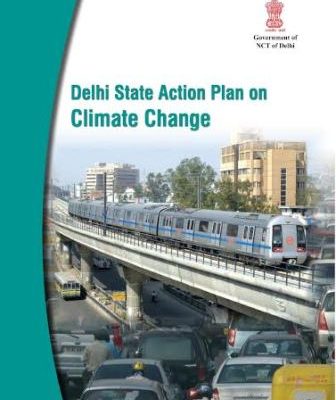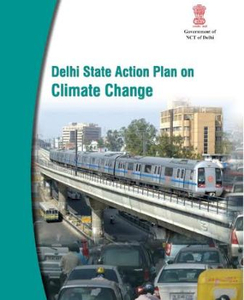Delhi State Action Plan on Climate Change – How it all began…

India’s National Action Plan on Climate Change (NAPCC) released in 2008, outlines the country’s strategy to meet the challenges of climate change. After the NAPCC was announced, the then Prime Minister of India called upon all the states of the country in an address on 18 August 2009 to expeditiously prepare their individual State Action Plans on Climate Change which would be parallel to the strategy outlined in the National Action Plan on Climate Change. To support the states for this cause, the Ministry of Environment and Forest (MoEF) circulated a set of guidelines – “A framework for the preparation of SAPCC’s” in November 2010. The state level action plans are envisaged to be an extension of the NAPCC at various levels of governance aligned with the 8 National Missions.
In January 2009, Delhi became the first federal state to have adopted a climate mitigation and adaptation plan complying with the National Action Plan on Climate Change. A framework for implementing a series of actions under the plan was initiated by the Government of Delhi. The plan had 65 agenda points for four years to fight climate, which was further consolidated into 36 agenda points. The framework aimed to encourage the use of solar power, increase the use of compact fluorescent lamps (CFLs) and light-emitting diode (LEDs), setting up of an electronic waste facility, provision of more CNG buses to promote public transport, promoting use of bio-fuel and shutting down coal fired power plants. The Government of Delhi has, since then, initiated several programs towards addressing adaptation and mitigation of climate change which have linkages with activities under the NAPCC. Recent studies show that Delhi falls in the areas of greatest climate variability, maximum vulnerability and lowest adaptive capacity.
The Department of Environment and Forests acted as the State Nodal Agency for the preparation of SAPCC. Sectoral working groups for formation of the State Action Plan comprising of officials from concerned departments were formed. These working groups are being chaired by heads of the respective sectors with a designated nodal officer. In addition to the representatives from the concerned department, the working groups also include experts from the field of Science and Technology, Academia, Research, NGOs and Civil Societies.
The working groups were sensitised with the climate change issues in Delhi. An orientation for approach and methodology to be followed in the preparation of SAPCC was conducted in early 2012. An Inception Workshop was also held which was represented by the line department heads, officers, experts from academia, research, NGOs and civil society representatives. The numerous discussions that took place were used as the guiding principle in formulating the action plan for various sectors. Extensive consultations within the working group members and other concerned stakeholders were also carried out. Actions, budget and the period of implementation of the proposed actions across the sectors were included in the action plan. An interim Delhi SAPCC report was submitted to the MoEF, Government of India for further comments and inputs. After incorporating the comments of the MoEF Expert Committee on Climate Change (ECCC), a draft report was further circulated to the stakeholders for comments. A series of meetings of the working groups on Climate Change were held thereafter under the Chairmanship of the Additional Secretary (Environment), Government of NCT of Delhi to discuss the draft report.
The key stakeholders in the formulation of Delhi’s SAPCC, which consists of several important chapters such as GHG Emissions Profile, Energy Consumption Profile, Energy and Power, Transportation, Health, Water, Urban Planning, Forest -Agriculture and Biodiversity, Vulnerability Assessment etc, includes the following key players:
- State Agencies like Delhi Development Authority (DDA), North Delhi Municipal Corporation (NDMC), South Delhi Municipal Corporation (SDMC), East Delhi Municipal, Corporation (EDMC), Public Works Department (PWD), Transport Department, Delhi Jal Board (DJB) and Delhi Pollution Control Committee (DPCC) etc.
- Universities, academia and research institutions like Indian Institute of Technology (IIT), Delhi University, and Mahatma Gandhi Institute of Combating Climate (MGICCC) etc.
- Industries and Industry Associations which will include all small, medium and large scale industries, Confederation of Indian Industry (CII) and Federation of Indian Chambers of Commerce and Industry (FICCI).
- Non Governmental Organizations like ICLEI South Asia, Centre for Science and Education (CSE) and TERI etc.
- Bilateral and Multilateral Organizations like United Nations Development Programme (UNDP), UK Department for International Development (DFID), World Bank etc.
- Civil Society Organizations.
- Press and Media.
Based on the discussions and inputs that have been provided by the various state departments, the Second Draft of Delhi State Action Plan on Climate Change is being currently prepared.




